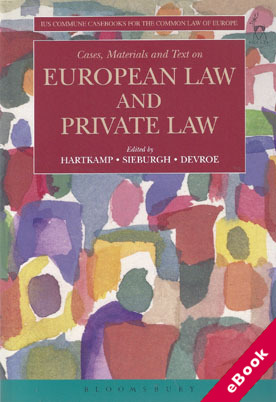
The device(s) you use to access the eBook content must be authorized with an Adobe ID before you download the product otherwise it will fail to register correctly.
For further information see https://www.wildy.com/ebook-formats
Once the order is confirmed an automated e-mail will be sent to you to allow you to download the eBook.
All eBooks are supplied firm sale and cannot be returned. If you believe there is a fault with your eBook then contact us on ebooks@wildy.com and we will help in resolving the issue. This does not affect your statutory rights.
This Casebook deals with the horizontal effects of EU law with regard to its effects on relationships between individuals. To a large extent, these effects have been created by the Court of Justice of the European Union (CJEU) on the basis of the European Treaties.
Whereas the impact of directives on private law has become more or less well-known by now, until recently the developments relating to primary EU law were hardly noted by private lawyers due to their inexperience in the field of EU law; and those developments were perhaps not sufficiently explained by scholars of EU law due to their inexperience with private law.
Although the focus of this Casebook is on the effects of developments in primary EU law (in particular TFEU provisions, general principles and Charter provisions), secondary EU law must not remain out of sight. The CJ case law relating to (non-)implementation of directives (including harmonious interpretation of national law and Francovich liability of Member States) is interesting in theory and important in the practice of the Member States.
The same is true for the ex officio application of provisions of consumer law directives imposed by CJ case law relating to this subject. It is not the intention to enter into the details of secondary law, eg the way in which individual directives are interpreted by the CJ or transposed in specific Member States or how the transposing legislation is interpreted in Member States.